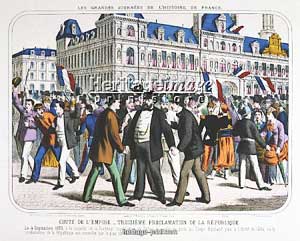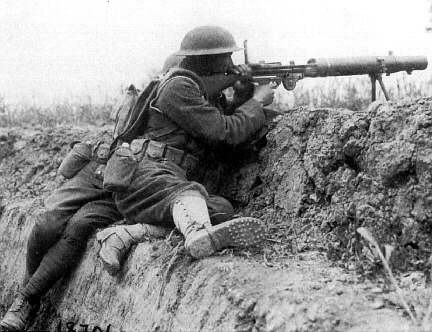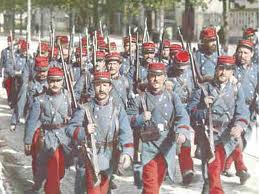The Prussian troops finally withdrew from Paris in March 1871, after a long siege that forced the Parisians to eat most of the animals on display in the Ménagerie at the Jardin des Plantes.
In late May, an insurrectionary government called Communards attempted an attack on the heart of Paris, so the Versailles government launched an offensive on the Commune.
The attack came to be known as La Semaine Sanglante (Bloody Week) and several thousand rebels were killed. The last of the insurgent Communards – cornered by government forces in the Cimetière du Père Lachaise – fought a hopeless, all-night battle among the tombstones.
In the morning, the 147 survivors were killed and buried in a mass grave. But that was just a small percentage of the 20,000 blue-collar Communards that were rounded up throughout the city and executed.

Despite its bloody beginnings, the Third Republic was fairly successful. It even paved the way for the Belle Époque.
The Belle Époque (Beautiful Time) was a period of prosperity that went on to be known for ground-breaking architecture and a series of advances in arts and science. Paris undeniably earned a worldwide reputation as a capital of the arts.
Popularity of the risqué cabaret show also soared during the Belle Époque, and Montmartre brothels attracted as many thrill-seekers as the newly erected Eiffel Tower did. The 1900s also brought other unthinkable miracles like electricity, bathrooms, lifts and central heating.
As well as all this glamour and sparkle, the Third Republic is infamous because of the Dreyfus Affair. That's the name history has donned to the murky business of 1894 when a Jewish army captain called Alfred Dreyfus was court-martialled and sentenced to life imprisonment on Devil’s Island because he was allegedly betraying military secrets to Germany.
Liberal politicians, artists and writers all over France began an impassioned defense of the captain and demanded to have the case reopened. The most famous protest is the novelist Émile Zola's open letter ‘J’accuse!’ (I Accuse!) which was published in the press and addressed to the President of the Republic.
The case was reopened – which disgraced the army and the Catholic Church in France. As a result, the military's more open attitude and, in 1905, the legal separation of the Catholic Church and the French state.
And the Belle Époque was about to come to an end as France decided to participate in the great war. One of the incentives for France to enter the First World War was the desire to claim back the provinces of Alsace and Lorraine, won from the Spanish on the 17th century and then lost to Germany in the Franco-Prussian War. The defeat was still fresh in the minds of the French and everyone on the country wanted to have a go at the krauts.
When the heir to the Austrian throne, Archduke Franz Ferdinand, was assassinated in Sarajevo on 28 June 1914, everything kicked off. Within a month, Germany had declared war on Russia and France.

During the War, Paris was at the forefront of the war effort. Marshal Joffre's troops, in alliance with the British, brought about the 'Miracle of the Marne' and Paris was spared an occupation.
By 1918, the city had become the scene of Allied victory parades instead.
1.3 million Frenchmen were killed in the First World War and, among the survivors, about a million was left crippled for the rest of their lives (being a cripple in the early 20th century was no fun). This level of tragedy obviously led to enormous social changes after the war.
The First World War had financial consequences as well. The country's national debt increased, there was an inflation of about 400% and income tax was established to pay for some of the costs. As the country fell short of about 3 million workers, a huge number of women entered the work-force for the first time.
Post-war Paris came alive as the world's creative capital, of the fashionable arts, theatre and cinema. It was the unofficial home of expatriates, hopelessly attracted to the careless, no-strings-attached (can we say bohemian?) lifestyle of Paris that was absent from most war-stricken cities.
Despite the worrisome state of the economy, -isms like Existentialism, Expressionism or Surrealism came to be in the city.

Montparnasse was the creative center of Paris and therefore of the world. Le Courbusier reinvented architecture and Hemingway or James Joyce drew from the electric atmosphere to create the most revolutionary novels of the century.
Composer Stravinsky found refuge in Paris having been exiled from Russia and Spanish painters Picasso and Dalí found like-minded artists in Montparnasse.
Paris's nightlife was internationally envied, establishing a cutting-edge reputation for everything from jazz to strip-tease.
However, all was not going well on the international relations side of things. Since the First World War, France and Germany had been locked into a cycle of compromise over border guarantees in the Rhineland.
The economically important regions of the Saarland and the Rhineland were placed under the authority of France. This was a source of bitterness amongst the Germans and when Adolf Hitler was named as German Chancellor in 1933, the situation rapidly deteriorated.
During most of 1930s the French, and the British, did their best to appease Hitler and the Nazi program of expansion which aimed to restore the 'rightful' boundaries of pre-First World War Germany.
Everyone desperately wanted to avoid another world war, everyone except the newly fascist states of Germany and Italy that is.
The Nazi expansion plan brought the reoccupation of the Rhineland which led to them to the Polish corridor (war with Poland was now inevitable). But, because of the Allied policy of appeasement, Hitler estimated that he could invade Poland without provoking a general war.
He was wrong.
Two days after the German invasion of Poland on 1st September 1939, Britain and France declared war on Germany.